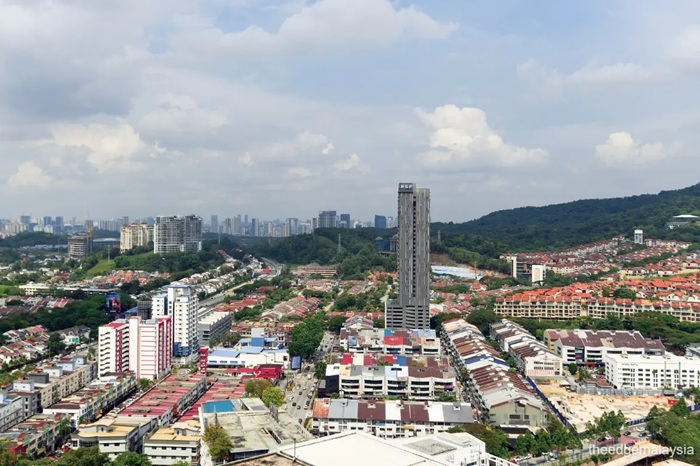Property players pin hopes on Budget 2026
The Edge Malaysia, 1 October 2025

As with every budget announcement, Budget 2026 — which will be tabled in Parliament on Oct 10 — is being closely watched, especially as the country navigates headwinds such as ongoing trade tensions and rising living costs.
City & Country spoke to key players in the property industry about their expectations and many are hoping for a review of the expanded Sales and Service Tax (SST), the reintroduction of a home ownership campaign to ease housing access, initiatives to revitalise ageing assets and preparations to address an ageing population. Read on to discover what else the industry hopes to see in Budget 2026.
Tan Ka Leong
Group managing director
CBRE | WTW Malaysia As Malaysia approaches Budget 2026, I believe there is an opportunity for policies that can improve housing affordability, strengthen investor confidence and prepare the country for demographic and market shifts.
As Malaysia approaches Budget 2026, I believe there is an opportunity for policies that can improve housing affordability, strengthen investor confidence and prepare the country for demographic and market shifts.
Housing affordability remains my top priority. With the expansion of the SST, I strongly urge the government to exclude serviced apartments and the residential components of mixed-use developments. Extending SST to these categories would only raise buyers’ costs, making it harder for Malaysians to own homes.
Beyond tax, the affordable housing agenda needs to be streamlined. Consolidating these agencies and reviewing eligibility criteria will create a clearer framework. Crucially, the scope should be widened to include the M40 group, who are increasingly squeezed by rising living costs yet often overlooked by current housing policies.
I also advocate for the reintroduction of the Home Ownership Campaign but with a sharper focus. It should apply only to existing and under-construction properties. This would support homebuyers while addressing the persistent market overhang. To further reduce unsold stock, I propose offering tax incentives to developers that extend the defect liability period by 24 months and provide discounts on overhang units. Such measures would boost buyer confidence while motivating developers to clear inventory.
For the commercial sector, I call for stronger support in revitalising ageing assets. The current RM300,000 tax relief (until end-2027) for refurbishment should be expanded, complemented by streamlined approval processes and low-interest financing. This would make retrofitting more viable, modernise older buildings and enhance Malaysia’s property competitiveness.
Meanwhile, short-term rental platforms such as Airbnb must be regulated to ensure safety and security compliance, balancing tourism benefits with community interests.
Finally, we must plan for an ageing society. Clear guidelines for senior living facilities are urgently needed to ensure safe, affordable and well-designed housing for our elderly population.
Chu Wai Lune
CEO
Gamuda Land
At Gamuda Land, we see housing as the foundation of thriving communities. As the government shapes Budget 2026, there is an opportunity to introduce supportive measures for aspiring buyers while strengthening long-term resilience within Malaysia’s housing market.
The affordability challenge affects the B40, M40 and younger Malaysians. Between 2012 and 2022, median incomes rose 5.7% annually while house prices rose by a yearly rate of 7.5% — a gap making homeownership increasingly unattainable. Extending the full stamp duty exemption for homes priced up to RM500,000, alongside partial exemptions for properties between RM500,000 and RM700,000, would provide targeted relief.
Financing access must also evolve to reflect new work patterns. Gig workers and freelancers should be able to qualify through alternative income documentation such as the Employees Provident Fund, Socso or verified e-wallet and bank records. This would ease entry into the housing market for younger and middle-income buyers.
Affordability must come with sustainability. A performance-based framework could reward developers that achieve recognised green certifications, such as GreenRE and the Green Building Index, a Diamond rating in the Low Carbon Cities Framework or the Malaysian Carbon Reduction and Environmental Sustainability Tool, with incentives such as higher plot ratios, reduced development charges or tax rebates. This would encourage broader industry adoption of sustainable practices, enabling developers to deliver quality homes while advancing Malaysia’s environmental and social goals.
Public transport usage in the Klang Valley and Malaysia is at 25% and 20% respectively, far below the 70% national target by 2040. Closing this gap requires stronger alignment between housing and transport planning.
Public-private partnerships could help deliver first- and last-mile solutions while national housing policies should ensure new townships are integrated with MRT, LRT and BRT networks. Embedding liveability into transit-oriented developments, including walkability, cycling paths and mixed-use amenities, will lower household costs, reduce congestion and support Malaysia’s sustainability ambitions.
Tang Chee Meng
Chief operating officer
Henry Butcher Malaysia
In line with the less robust performance of the property market for 1Q2025 and 1H2025, based on the statistics released by the National Property Information Centre and considering the current global geopolitical and trade uncertainties, the Malaysian property market is expected to be flattish or, at best, grow at a slower pace for the rest of the year and probably the following year.
Therefore, it would be helpful if the government could support the property sector with incentives to stimulate buying interest — such as extending the stamp duty waiver for residential units priced at RM300,000 and below, and setting up a fund to help first-time homebuyers of affordable homes bridge the gap between the purchase price and their approved housing loan. Oftentimes, people in the B40 group do not have the means to come up with the down payment required to book their houses.
To encourage developers to adopt a build-then-sell approach, the government can offer incentives such as waivers and reductions in certain statutory contributions, speedier approvals and structuring subsidies, and more attractive interest schemes on bridging and term loans to developers to finance the construction of the houses.
In line with the growing awareness of the need to control or slow down climate change and adopt environmentally sustainable practices, the government can encourage developers to adopt more environmentally friendly, sustainable and green concepts that promote greater energy efficiency and inflict less damage on the existing surrounding environment of their projects by offering such developments various incentives, which can be in the form of lower statutory contributions, fees, end-financing schemes at preferential rates or even lower assessment rates for a certain number of years.
Tan Mei Sian
Deputy group CEO
IGB Bhd
For Budget 2026, we hope the government will announce incentives focusing on key areas to drive the property sector forward.
To promote environmental sustainability, we propose expanding the Investment Tax Allowance to cover a greater number of properties, encouraging the upgrading of existing buildings. This would help preserve embodied carbon and reduce emissions compared to new construction. Greater incentives should also be offered for green building certification, including tiered tax rebates and a “perform-to-earn” grant that rewards verified, ongoing energy and water savings.
To address the affordable housing requirements, we recommend establishing a government-run Collaborative Affordable Housing Fund. Developers would contribute financially to this fund, which would then be used to build quality, affordable homes in strategically identified locations with access to jobs, transport and public amenities. This model ensures that affordable housing efforts are more efficient and impactful by targeting real needs, rather than being limited to scattered, on-site projects.
To promote sustainable urban development, we hope Budget 2026 can incentivise local authorities with grants or funds to reduce minimum carpark requirements in transit-oriented developments to support a public-first transport ecosystem. We also hope the budget will provide incentives for shared parking facilities and investments in building more sidewalks and dedicated bike lanes in both new and existing developments. These measures would encourage the creation of more walkable and liveable cities while aligning local policies with national sustainability goals.
Lastly, to boost the M-REIT (Malaysian real estate investment trust) market, we hope the government will extend the prevailing withholding tax concession that expires in December 2025 and waive the withholding tax for all individual unitholders. These measures would align the M-REIT tax structure with regional competitors and help attract more foreign and domestic capital into the Malaysian real estate sector, contributing to the overall development of the economy.
Datuk Tony Ling Thou Lung
CEO
IJM Land Bhd
As Malaysia charts its path towards a more resilient and inclusive future, IJM Land urges the government to consider targeted policy measures in Budget 2026 that will enable the property and infrastructure sectors to serve as catalysts for national growth, social equity and sustainability.
Our proposals reflect both current ground realities and the pressing need for adaptive responses to demographic, economic and environmental transitions. We believe the property sector is well positioned to support key government goals, be it in attracting high-quality foreign investment, improving homeownership access, meeting sustainability targets or preparing for an ageing population.
In particular, the introduction of incentives for co-located industrial-residential developments in foreign direct investment growth zones can create thriving, self-contained communities with seamless access to jobs, transport and amenities. Likewise, a refreshed homeownership stimulus, akin to the Home Ownership Campaign, will address affordability challenges, especially for first-time homebuyers.
Given the higher costs of sustainable and energy-efficient construction, we urge the government to review and rationalise statutory compliance charges and introduce direct tax rebates for developers that meet recognised green certification standards. This support will ensure developers can continue raising the bar on environmental responsibility without compromising affordability for homebuyers.
Finally, we believe wellness-oriented and assisted living developments should be recognised as a national priority, with corresponding planning levers and targeted incentives to encourage more developers to enter this space.
We stand ready to work with the government and other stakeholders in co-creating solutions that align with national goals, address investor and community needs, and unlock long-term value for all.
Jamie Tan
Managing director
JLL Malaysia
Clearer guidelines are needed for service tax expansion, particularly under Group L: Construction Works Services. At present, there is a risk of double taxation that increases the tax burden and creates uncertainty for contractors and developers. Such tax costs would be passed through to end-consumers.
The introduction of service tax on non-residential property leasing services makes it more difficult for landlords to increase rents during tenancy renewals. As a result, landlords, especially those managing older buildings, struggle to set aside funds for refurbishments, retrofitting and essential repairs. Targeted tax incentives or partial exemptions could help cushion the impact, ensuring building quality and competitiveness are not compromised in the long term.
Many commercial buildings in Malaysia are at least 20 to 30 years old and require upgrading to meet modern standards of safety, sustainability and tenant expectations. Specific tax exemptions or accelerated capital allowances for asset enhancement initiatives would encourage landlords to reinvest in these “sick” or ageing assets, extending their useful life and supporting urban renewal.
The recent proposal on making build-then-sell (BTS) mandatory may not be suitable across all market segments. The traditional sell-then-build (STB) model played a pivotal role in making housing more affordable, particularly for first-time homebuyers, and helped spur the growth of Malaysia’s residential property market for many decades. A more balanced approach, where developers can opt for BTS or STB with additional safeguards, would better serve both developers and homebuyers while maintaining housing supply and affordability.
With the carbon tax scheduled for 2026, a clear and transparent framework is critical. The tax should start with energy-intensive sectors and expand gradually, with revenues reinvested into decarbonisation technologies and small and medium enterprise support. A phased approach would help align Malaysia with international standards, protect exporters from competitiveness risks and channel funds into the country’s green transition.
Keith Ooi
Group managing director
Knight Frank Malaysia
As Malaysia prepares Budget 2026 — the first under the 13th Malaysia Plan — Knight Frank Malaysia highlights measures that could strengthen the property market while advancing sustainability and inclusivity.
Green and sustainable development: Tax incentives for eco-friendly projects certified under the Green Building Index or other recognised standards can accelerate adoption of green building practices. Grants for retrofitting existing homes with solar panels, insulation and other energy-saving upgrades would improve housing stock and lower long-term costs. Support for heritage building refurbishment can also preserve cultural assets through adaptive reuse.
Housing and community: Affordability remains crucial. Rebates for B40 households and first-time buyers can widen access, while incentives for transit-oriented housing near MRT and rail stations promote denser, more connected living. Policies that encourage repurposing vacant malls and offices into co-working hubs or affordable housing would unlock underutilised assets. Federal-state co-funding mechanisms could further align national and local housing goals.
Industrial and high-value sectors: With the rise of data centres, Malaysia should establish zoning rules and sustainability standards to balance growth with environmental responsibility. Incentives for semiconductors, AI and other high-tech industries will also spur demand for smart logistics hubs and industrial parks.
Process and tax reforms: Digitalised approval systems can shorten project timelines and boost investor confidence. Removing the SST on sinking funds for commercial strata properties would ease unnecessary burdens on owners and managers.
This wish list reflects Knight Frank Malaysia’s priorities for Budget 2026 — balancing growth with inclusivity, sustainability and long-term value for stakeholders.
Tan Sri Leong Hoy Kum
Founder and group managing director
Mah Sing Group Bhd
The property market faces global economic volatility, ongoing trade tension, inflationary pressures and higher living costs, hindering home purchases for younger generations and first-time homebuyers.
We propose that the government launch a new Home Ownership Campaign from Jan 1, 2026, including measures proven to help homebuyers secure homes and boost homeownership. These measures are a 100% stamp duty exemption on the memorandum of transfer and loan agreement for properties priced up to RM1 million for first-time homebuyers and a requirement for registered developers to offer at least a 10% discount on properties priced from RM300,000 to RM1 million, based on property valuation.
Additional initiatives such as tax relief, maintaining the Skim Jaminan Kredit Perumahan (Housing Credit Guarantee Scheme) and offering preferential mortgage rates for first-time homebuyers will further ease financial barriers.
The reintroduction of the Developer Interest Bearing Scheme (DIBS) for first-time homebuyers, with the bank loan tied to property valuation, will prevent market speculation. DIBS ensures homebuyers pay a 5% down payment with no loan repayments during the construction period, reducing upfront financial pressure.
Changing the tax relief on mortgage interest to RM10,000 annually for three to five years, extending it to properties priced up to RM1 million and expediting the implementation of the Madani Deposit Scheme, with funds channelled directly into the housing loan account or used as part of the down payment, will strengthen buyer commitment while addressing issues of raising the deposit sum for property purchase and assist buyers without sufficient EPF savings or other sources of financial support.
The removal or reduction of compliance costs such as development charges, lowering land conversion premiums and waiving utility contribution fees and charges will lower house prices, while streamlining regulations and approval processes shortens project completion timelines, making homes more affordable and delivered faster to homeowners.
Oliver Wee
President
Master Builders Association Malaysia
As the government prepares for Budget 2026, the first under the 13th Malaysia Plan, the Master Builders Association Malaysia urges a focus on four core areas: tackling cost pressures; fair tax implementation; accelerating technology adoption; and ensuring policy consistency.
The industry continues to face significant challenges from volatile building material prices and rising business costs. Compounding this is the new SST on construction services, which places an undue burden on contractors locked into fixed-price contracts.
We strongly appeal to the government to apply the SST only to contracts executed after Jan 1, 2026. This provides the industry with a crucial transition period and prevents disruption to ongoing projects, which is vital for maintaining project stability and managing cash flow.
To enhance productivity, the government should introduce grants and tax relief to lower the high upfront cost of adopting modern technologies such as the Industrialised Building System and Building Information Modelling. Incentivising green building materials will also align the sector with Malaysia’s sustainability goals.
Finally, the industry requires a clear pipeline of public infrastructure projects. We advocate the continued use of the public-private partnership model to ensure the timely rollout of critical projects without over-stretching public finances. A predictable project flow allows industry players to invest in capacity and skills with confidence.
These measures will empower the construction sector to manage current challenges while building a more technologically advanced and resilient industry for Malaysia’s future.
Chai Keng Wai
Co-CEO, property development division
Matrix Concepts Holdings Bhd
We hope Budget 2026 will introduce policies that balance affordability, sustainability and regional growth to strengthen Malaysia’s property sector — for instance, initiatives that support homeownership among first-time buyers.
With the recent overnight policy rate adjustment potentially easing borrowing costs, complementary measures such as enhanced stamp-duty exemptions and down-payment assistance will be crucial. These incentives can help younger Malaysians and the M40 group, particularly in urban and semi-urban areas, take their first step towards homeownership.
We also hope to see policies that help in advancing sustainability in property development. In line with the nation’s sustainability agenda, stronger support for ESG-driven developments is vital. We recommend corporate tax deductions, development grants and import duty waivers for renewable energy adoption, green infrastructure and low-carbon building materials. These measures will encourage developers to embed sustainability at the core of township planning.
We wish to see more initiatives that drive regional growth beyond the Klang Valley, as balanced growth should remain a national priority. Greater investment in highways, public transport and digital infrastructure across secondary cities and growth corridors will stimulate housing demand, create new economic hubs and reduce regional disparities.
Meanwhile, a simplified, standardised digital approval process across states is critical in streamlining property development approvals. Faster approvals will reduce bureaucratic delays, shorten delivery timelines, optimise costs and ensure the timely supply of quality housing to meet demand.
Last but not least, as the property sector continues to face headwinds from high compliance costs, approval delays and construction-cost volatility, we hope Budget 2026 will introduce policies that not only improve housing affordability but also strengthen a resilient and sustainable ecosystem for Malaysians.
Saleha Yusoff
Executive director and regional head of research and consulting
Nawawi Tie Leung Property Consultants Sdn Bhd
As at 1Q2025, Penang faced a critical challenge in its housing market with a total of 16,845 overhang and unsold residential units, including serviced apartments and SoHo (small office, home office). Of this, 51% (8,680 units) are condominiums and 23% (3,854 units) are serviced apartments, reflecting a structural imbalance between supply and demand.
The overhang is heavily concentrated in the RM300,000-to-RM1 million price range, which accounts for nearly 79% of total unsold stock. Within this segment, condominiums and serviced apartments dominate, particularly in the RM300,000-to-RM500,000 bracket, where they contribute more than two-thirds of unsold units.
To resolve this issue, Budget 2026 must introduce targeted federal interventions. On the demand side, enhanced first-time homebuyer incentives, such as raising stamp duty exemption thresholds and introducing interest subsidies, would directly stimulate absorption in the mid-market segment. Rent-to-own schemes and institutional bulk purchase programmes (via pension funds and cooperatives) can accelerate clearance while aligning with national housing objectives.
On the supply side, fiscal incentives should encourage repurposing of overhang units into student housing, senior living or managed rental products. At the same time, stricter planning and market feasibility requirements are needed to prevent further oversupply, especially in high-rise categories.
We urge the government to allocate resources for a Penang Housing Clearance Taskforce under Budget 2026. This initiative will not only help reduce the overhang but also reset the residential market towards affordability, liveability and sustainable long-term growth.
Samuel Tan
Founder and CEO
Olive Tree Property Consultants
Budget 2026 can cement Johor’s role as Malaysia’s southern growth powerhouse. With the Johor–Singapore Special Economic Zone framework, mobility of goods and people is critical.
The upcoming Johor Bahru–Singapore Rapid Transit System (RTS) Link and Johor Bahru’s planned elevated Autonomous Rapid Transit network should be positioned as a unified, complementary system that enhances last-mile connectivity and cross-border accessibility. When the RTS operates in 2027, focus should be on funding allocation for last-mile bus feeders, station area upgrades and CIQ (customs, immigration and quarantine) staffing to maximise throughput. This should be paired with transit-oriented developments (TODs) around Bukit Chagar and Wadi Hana Depot.
For the property market, Johor Bahru still faces a mismatch in overhang and affordability. Calibrating demand with targeted stamp duty relief for first-time homebuyers in designated transit corridors and a rent-to-own pathway for completed unsold units are possible measures to reduce the overhang issues. Speeding up planning approvals with statutory service-level agreements and publishing project-level data dashboards will be able to boost investor confidence.
The Urban Renewal Act can be transformative for Johor Bahru’s ageing strata stocks. Budget 2026 should fund pilot precincts that test fair compensation models, practical consent thresholds, relocation support and green-retrofit incentives. Density bonuses, land readjustment and blended public-private financing can unlock underutilised plots while protecting existing communities.
The operation of the electrified double track trains from Kuala Lumpur to Johor Bahru is timely. The other districts should also benefit from this growth momentum. Smaller TODs can be developed in Kluang, Segamat and Gemas.
Amendments to include commercial properties under the Housing Development Act 1966 are timely. However, this should not over-regulate the industry. Proof-ringing this sector must be done judiciously.
Datuk Ho Hon Sang
President
Real Estate and Housing Developers Association Malaysia
We propose the revival of the Home Ownership Campaign, with targeted incentives until Dec 31, 2026. It will cover all buyer categories, including first-time purchasers and upgraders, with stamp duty exemptions on the memorandum of transfer for homes priced between RM300,001 and RM1 million, as well as on loan agreements for properties from RM300,001 to RM2.5 million. These exemptions apply solely to primary transactions from developers.
Despite efforts to reduce business costs, the property sector faces rising construction expenses due to the 6% SST. Since materials are already taxed, adding labour charges exposes materials to double taxation. Rather than splitting contracts, Rehda proposes an overall 3% construction cost rate, instead of 6%.
On delivery systems, Rehda emphasises that the sell-to-build model should co-exist with the build-to-sell model. Making the latter mandatory, as suggested in the 13th Malaysia Plan, could shrink housing supply, raise construction costs and reduce competitiveness. Developers may face higher equity outlays, negative cash flow and financial distress, while buyers risk higher prices and fewer choices. Financiers, too, would shoulder greater risk with reduced lending appetite.
To advance the ESG agenda, Rehda calls for enhanced green tax incentives. This includes extending the Green Investment Tax Allowance beyond its 2026 expiry by 10 years, widening its scope to cover tenants, refurbishment costs and consultant fees, while also reducing MyHijau listing charges. Incentives such as reduced development charges, higher plot ratios and rebates on assessment fees for certified green homes are also proposed. In addition, double tax exemptions are recommended for expenses incurred in ESG and green initiatives.
Datuk Paul Khong
Group managing director
Savills Malaysia
We hope that Budget 2026 uses the real estate platform as a key growth catalyst sector for 2026 and beyond.
The property sector has been on the “back burner” for years, and refocusing here will surely bring back a trajectory of growth that is much needed for both this sector and the economy as a whole, thus creating synergies to all other related businesses. Though this sector has recovered steadily after the pandemic, any new boost will help push it a level higher.
Our property wish list calls for a significant boost to the sector, including a blanket waiver of the real property gains tax across all property segments, to stimulate market activity, drive demand, and attract both local and foreign investors.
The industrial, manufacturing and logistics sectors, along with data centres, performed well in 2024/25. Further uplift in capital values will enhance wealth creation through property ownership, benefiting citizens and local property owners who currently lag behind those in neighbouring countries.
Next, a short two- or three-year waiver on stamp duty for all categories of transfers will be helpful to re-energise the property market during the current turbulent times and to attract more foreign funds and investments into real estate and Malaysia.
There should also be more incentives and tax allowances, along with lower-interest loans, to encourage higher homeownership and ease the financial burden of new buyers. In addition, the Home Ownership Campaign should be reintroduced in 2026, as it has proven effective in boosting local homeownership while addressing both property sales and overhang issues.
Datuk Seri Azmir Merican
Group managing director and CEO
Sime Darby Property Bhd
In anticipation of Budget 2026, we see opportunities for measures that can help the property sector manage rising costs, address compliance pressures, strengthen ESG-readiness, and safeguard the industry’s long-term sustainability.
Construction and operational costs are projected to rise by 8.5% to 9.5% by 2026, driven by raw material volatility, higher labour costs and electricity tariff reforms. Contractors are already pricing in premiums to hedge against uncertainty. These increases not only strain developers’ margins but also ripple through the supply chain — affecting housing affordability nationwide, pressuring smaller players and increasing operating costs across offices, malls and industrial properties, which ultimately shapes everyday living costs.
To ease these pressures, we hope the expanded SST is applied prospectively and temporary relief is provided on import duties for essential materials.
While larger developers are aligning with sustainability standards, the broader supply chain’s capability and readiness are not yet at the level required for ESG compliance, including carbon accounting and labour standards. The anticipated carbon tax further heightens this gap. We recommend a phased-in approach to carbon taxation, coupled with targeted incentives for low-carbon or green-certified developments. Capacity-building programmes and tax reliefs for small and medium enterprises in the supply chain will ensure that the entire industry, not just large players, can transition effectively.
Ensuring long-term stability and strengthening the industry requires addressing challenges such as abandoned housing, while enabling growth in industrial development. A tiered licensing regime would help build public trust, while streamlined “green lane” approvals for high-impact projects would support the government’s efforts to attract foreign investment.
Such measures would give Malaysia a sharper competitive edge in the global industrial race.
Datuk Zaini Yusoff
Chief operating officer
S P Setia Bhd
For the upcoming Budget 2026, we anticipate strategic incentives aimed at addressing housing affordability, supporting the expansion of the industrial and data centre segments, advancing catalytic infrastructure projects, and emphasising ESG priorities.
Looking ahead, domestic demand remains resilient, and we hope to see the return of an enhanced Home Ownership Campaign, supported by enhancements and targeted tax exemptions.
We also urge the government to consider expanded loan relief programmes, longer repayment tenures and flexible financing options for both fixed and non-fixed income earners.
We encourage the government to provide support through tax incentives and exemptions for green, energy-efficient products, alongside tax reliefs for the adoption of the Industrialised Building System to address labour shortages and cost pressures.
We also urge improvements in regulatory efficiency by refining and expediting approval processes and timelines, enabling developers to deliver projects more promptly. In addition, we propose prioritising and investing in advanced digital infrastructure to modernise land administration processes.
A key initiative under the 13th Malaysia Plan targets the construction of about one million affordable homes between 2026 and 2035. We welcome greater collaboration between the government and private developers, and look forward to supporting this effort through our own projects.
We applaud the Ministry of Housing and Local Government for seeking additional funds under Budget 2026 to implement more public infrastructure projects, which will greatly benefit ongoing developments in key regional hotspots.
We also encourage continued collaboration between the government, developers, financial institutions and household banks to help reduce the national property overhang and stimulate market demand.
Further relaxation of conditions for the Malaysia My Second Home programme is welcomed to boost foreign direct investment.
Hafizuddin Sulaiman
Officer in charge and chief financial officer
UEM Sunrise Bhd
Housing affordability, inclusivity and sustainable sector growth remain national priorities. Budget 2026 presents an opportunity for the government to strengthen long-term resilience in the property sector while addressing the immediate challenges faced by homebuyers, developers and communities.
The Budget should reintroduce targeted support for first-time homebuyers — such as stamp duty waivers, interest subsidies and income tax relief — to ease homeownership for B40 and M40 families.
Developers delivering affordable and mid-market homes should benefit from tax relief to strengthen supply. A clearer framework for build-to-rent can diversify housing options, stabilise rental markets and ensure long-term affordability.
The Johor-Singapore Special Economic Zone holds strong potential to drive growth. Incentives should be broadened to include master developers and infrastructure providers, while clearer approval guidelines would help unlock this potential. Enhanced cross-border facilitation for Singaporean small and medium enterprises could further stimulate industrial and residential development.
Furthermore, incentives for the Industrialised Building System and Building Information Modelling, along with support for senior-friendly and multigenerational housing, will also enhance inclusivity.
Simplifying approval processes and stronger inter-agency coordination can reduce costs and delivery timelines. Clearer alignment of development-related charges across states would improve predictability for long-term planning. Automatic release of unsold bumiputera units after a fixed period would boost project take-up. Stronger financing support or deposit assistance can reduce housing overhang risk. In addition, reassessing current Economic Planning Unit approval requirements would improve the competitiveness and execution timelines of government-linked companies.
Revitalising ageing precincts is vital to optimising underutilised land. Special tax allowances and co-investment schemes for infrastructure would encourage brownfield and transit-oriented developments. A timely rollout of the Urban Renewal Act, backed by tools such as land amalgamation and cost-sharing mechanisms, would enhance the viability and sustainability of redevelopment efforts.
(Web Source: https://theedgemalaysia.com/node/770876)



